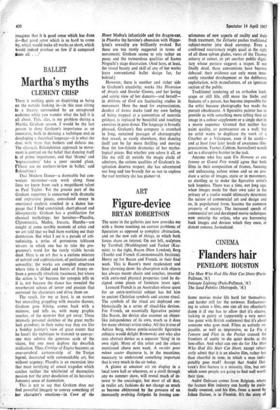Martha's myths
BALLET CLEMENT CRISP
There is nothing quite so dispiriting as being on the outside looking in—in this case sitting In a theatre surrounded by an enraptured audience while you wonder what the hell it is all about. This, alas, is my problem during a Martha Graham season. I would be the last person to deny Graham's importance as an innovator, both in devising a technique and in developing a theatrical language—it is what she does with them that bothers and defeats me. The classical, Balanchinian approach to move- ment is centred on the belief that dancing itself Is of prime importance, and that 'drama' and 'expressiveness' take a poor second place. 1'There are no mothers-in-law in ballet,' said Balanchine.) That Modern Dance—a damnable but con- venient misnomer—can work along these lines we know from such a magnificent talent as Paul Taylor. Yet the greater part of the Graham repertory is concerned with dramatic and expressive pieces, convoluted essays in emotional analysis couched in a dance lan- guage that I find constricted, short-phased and idiosyncratic. Graham has a predilection for classical mythology; her heroines—Phaedra, Clytemnestra, Medea, Jocasta, Hecuba—are caught at some terrible moment of crisis and we are told that we find them working out their damnation. But what I see is a parade of atti- tudinising, a series of portentous tableaux vivants in which one has to take the pro- gramme's word for the rarely visible heroic deed. Here is an art that is a curious mixture of naivete and sophistication, of puritanism and sensuality; the works are complex structures where time is elided and bursts of frenzy en- liven a generally ritualistic treatment, but where the action is `so' because the synopsis tells us it is, not because the dance has revealed the reverberant echoes of terror and passion that surround the characters and drive them on.
The result, for me at least, is an earnest but unavailing grappling with massive themes; Graham goes fishing, comes back with a minnow, and tells us, with many graphic touches, of the monster that got away. These intensely personal sketches of the great myths lack grandeur; in their naive way they are like a Sunday painter's view of great events that he hasn't the technique to transmit to canvas: one may admire the generous scale of the vision, but one must deplore the dwarfish realisation. Thus, Cortege of Eagles becomes an over-cerebral cartoon-strip of the Trojan legend, decorated with commendable art, but without urgency; Phaedra is an excursion into that most terrifying of sexual tragedies which catches neither the whirlwind of destructive passion nor the utter desolation of its heroine's Jansenist sense of damnation.
This is not to say that Graham does not find powerful imagery to convey something of her character's emotions—in Cave of the
Heart Medea's infanticide and the dragon-car, in Phaedra the heroine's obsession with Hippo- lytus's sexuality are brilliantly evoked. But these are too rarely suggested in terms of movement; Graham seems to rely rather on poses and the tremendous qualities of Isamu Noguchi's stage decoration. (And here, at least, the visual beauty and skill of any of her works leave conventional ballet design far, far behind.) However, there is another and richer side to Graham's creativity; works like Diversion of Angels and Secular Games, and her loving and satiric view of her dancers—and herself— in Athletes of God are fascinating studies in movement. Here the need for expressionism, deadest of dance ducks (and my own feeling of being trapped at a convention of neurotic geishas), is replaced by beautiful and touching exercises in pure dance. The language is broadly phrased, Graham's fine company is stretched in long, sustained passages of choreography that reveal, as rarely elsewhere, that dancing itself can be far more thrilling and moving than the low-falutin dramatics of her mytho- logical pieces. But whether you adore it all, or like me still sit outside the magic circle of admirers, the serious qualities of Graham's in- spiration deserve respect; she has adventured too long and too bravely for us not to explore the vast territory she has pioneer-d.






























 Previous page
Previous page